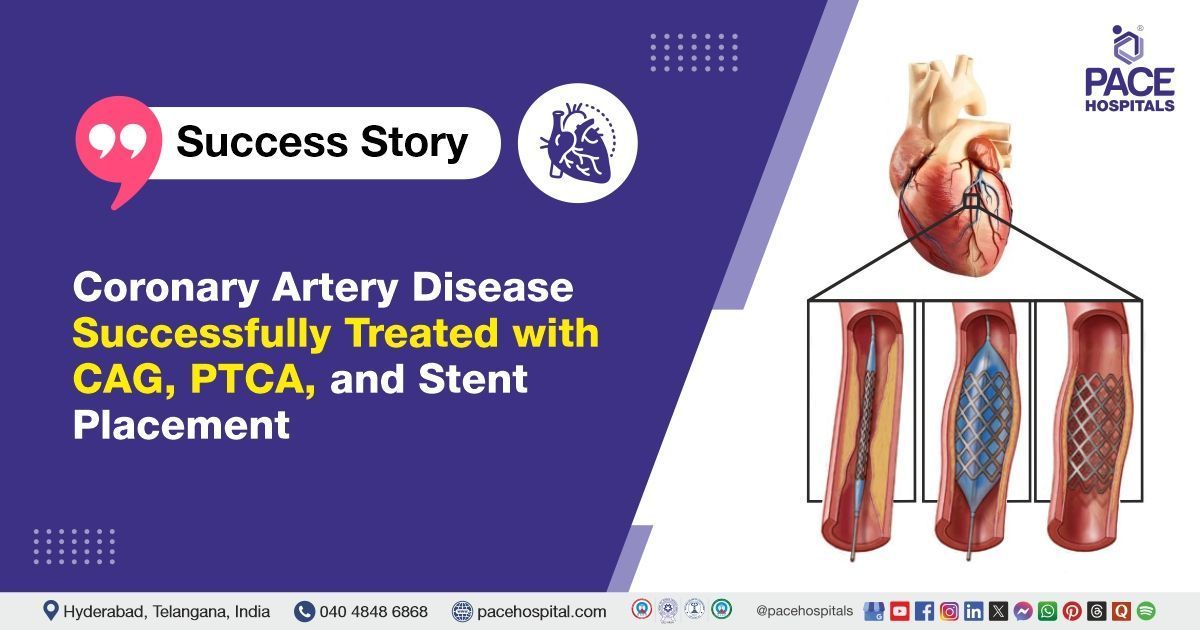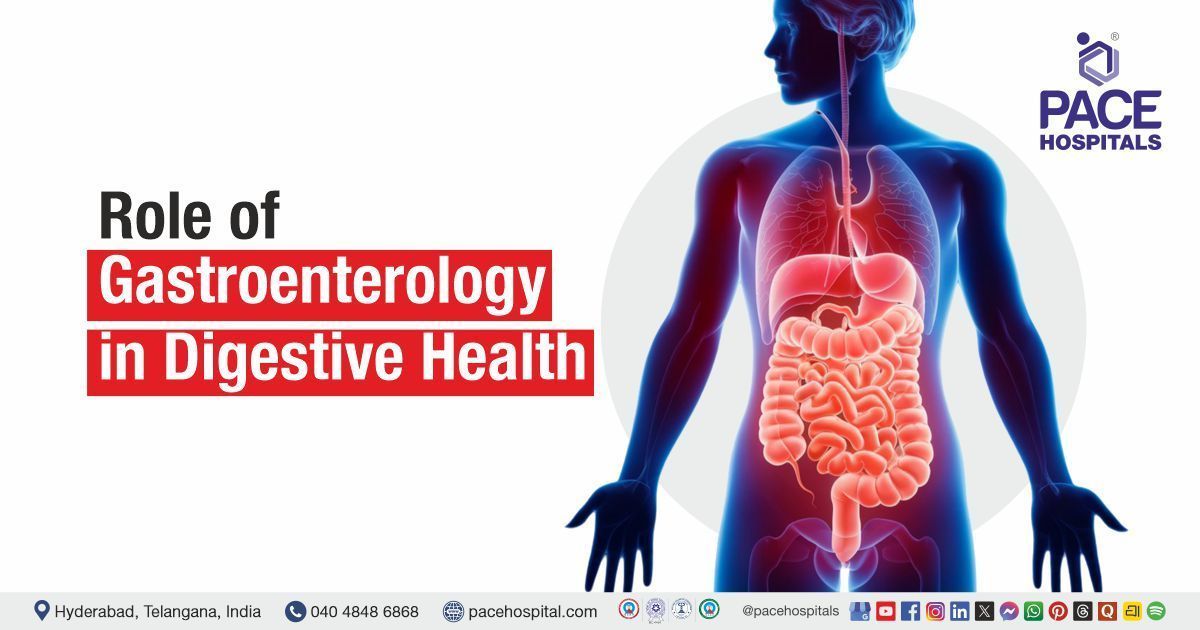Coronary Artery Disease Successfully Treated with CAG, PTCA, and Stent Placement
PACE Hospitals
PACE Hospitals’ Cardiology team successfully performed a Coronary Angiogram (CAG) followed by Percutaneous Transluminal Coronary Angioplasty (PTCA) with stent placement in the Right Coronary Artery (RCA) to effectively treat a significant arterial blockage caused by coronary artery disease, restored the normal blood flow to the heart, and reduced the risk of future cardiac events.
Chief Complaints
A 62-year-old female patient presented to the Cardiology Department at
PACE Hospitals, Hitech City, Hyderabad, with complaints of chest pain associated with discomfort radiating to the left arm.
Medical History
The patient has a known medical history of
hypertension and
type II diabetes mellitus.
General examination
Upon admission to PACE Hospitals, the patient's vital signs were stable. On general examination, the cardiovascular system (CVS) showed normal heart sounds (S1 & S2 were present). The central nervous system (CNS) was non-focal with no deficits (NFND). The respiratory system (RS) reveals bilateral airway entry with normal vesicular breath sounds. On abdominal examination (P/A), the abdomen is soft and non-tender, with no signs of organomegaly.
Diagnosis
After a thorough physical examination, the doctors identified chest pain associated with discomfort radiating to the left arm, and diagnostic tests later confirmed coronary artery disease (CAD).
Coronary artery disease (CAD) is a condition in which coronary arteries become blocked due to plaque buildup, causing reduced blood flow to the heart muscle. This can lead to chest pain, shortness of breath, or heart attacks. Type II diabetes mellitus, a metabolic disorder characterized by high blood sugar levels, can accelerate the development of coronary artery disease (CAD) and increase complications. Hypertension is another major risk factor for coronary artery disease (CAD), as it can cause artery damage, further narrowing, and increased heart disease risk. These conditions create a complex interplay that increases the risk of cardiovascular events and requires careful management to reduce complications and improve overall health.
Medical Decision Making (MDM)
After consulting with Dr. Sashi Vardhan Janjirala, along with other consultant Dr. Tripti Sharma, a comprehensive evaluation was conducted to determine the appropriate course of treatment for the patient. Their collective expertise led to the conclusion that a coronary angiogram (CAG), percutaneous transluminal coronary angioplasty (PTCA) and stent in the right coronary artery (RCA) would be the most appropriate treatment for coronary artery disease.
Surgical procedure
All necessary investigations were completed, and a cardiology consultation was obtained for further assessment. The patient subsequently underwent a coronary angiogram (CAG), which revealed significant stenosis in the right coronary artery (RCA). In response, the cardiology team performed percutaneous transluminal coronary angioplasty (PTCA) with stent placement in the RCA, effectively restoring blood flow and managing the underlying coronary artery disease.
A drug-eluting stent was successfully placed via the femoral artery approach to restore adequate blood flow and prevent future narrowing of the vessel. The patient remained hemodynamically stable throughout the procedure.
Postoperative Care
The recovery following surgery was uneventful, with no complications. post-procedure, patient was monitored closely for any potential complications.
Medications Advised at the stay
During the hospital stay, the patient was managed with medications including antibiotics, antacids, antipyretics, and intravenous (IV) fluids. Upon stabilization, the patient was deemed fit for discharge in a hemodynamically stable condition and was advised to continue the prescribed medications at home.
Discharge Medications
Upon discharge, the patient was prescribed a treatment regimen that included antidiabetic medications, antiulcer agents, nonsteroidal anti-inflammatory drugs (NSAIDs), and insulin. These medications were advised to manage her underlying conditions and support ongoing recovery. The patient was also instructed to follow up regularly for monitoring and dose adjustments.
Emergency Care
The patient was informed to contact the Emergency Ward of PACE Hospitals, Hyderabad, if she observes any symptoms such as fever, abdominal pain, or vomiting.
Review notes
The patient was advised to schedule a follow-up appointment with Dr. Sashi Vardhan Janjirala in the OPD after 2 weeks. Additionally, a review was conducted after 5 days, with fasting and post-meal blood sugar results taken on alternate days, under the care of Dr. Tripti Sharma.
Significance of Coronary Angiography in Detecting and Managing Heart Blockages
Coronary angiography is a specialized imaging test used by a cardiologist/heart specialist to detect blockages in the heart’s blood vessels. It involves injecting a contrast dye into the coronary arteries through a thin tube (catheter) inserted via the wrist or groin. X-ray images are then taken to visualize the blood flow in the arteries. If any narrowing or blockage is present, it appears clearly on the images. This helps doctors identify the exact location and severity of the blockage. It is especially useful in patients with chest pain or suspected heart disease. The test also guides treatment decisions, such as whether angioplasty or stenting is needed. Overall, it plays a key role in diagnosing and managing coronary artery disease.
This case reinforces the effectiveness of Coronary Artery Disease treatment in Hyderabad, with timely intervention and advanced cardiac care offered at PACE Hospitals.
Get an appointment with
Share on
Request an appointment
Fill in the appointment form or call us instantly to book a confirmed appointment with our super specialist at 04048486868
Appointment request - health articles
Recent Articles











